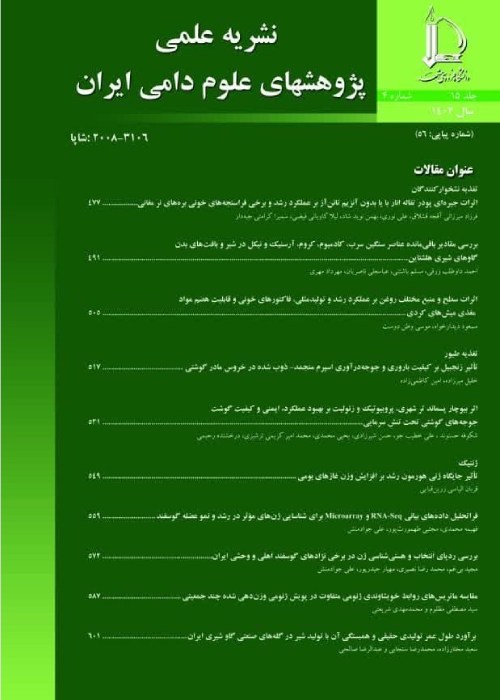Evaluation of vitamin C supplementation on growth performance and antioxidant activity of Holstein suckling calves
It has been documented many times in various articles that the plasma vitamin C concentrations have been severely reduced during stress and disease in calves. Another report shows that the production of endogenous vitamin C was not apparently observed in dairy calves up to 4 months of age, and therefore the suckling calf depended on relatively low concentrations of vitamin C in consumed milk. Therefore, suckling calves are exposed to various pathogens that cause various diseases and consequently economic loss. One of the most important causes of mortality in suckling calves is their susceptibility to infections, since calves are more susceptible to intestinal and respiratory infections resulting in high mortality during this period. Therefore, use of dietary supplements and vitamins can improve the immune system and growth performance. Vitamin C is a water-soluble vitamin that has antioxidant properties and can kill free radicals produced in cells. The amount of vitamin C in the animal is reduced during stress and exposure to the disease. Therefore, providing it through starter rations can improve animal performance. There is limited research about the effects of vitamin C on the immune system and its beneficial effects in suckling calves. Hence, this study was aimed to evaluate the supplementation of vitamin C on growth performance and immune system of Holstein suckling calves.
For this experiment, 40 newborn Holstein calves with an average age of 1-10 days, and about 36±1 kg weight, were used in a completely randomized design with 2 treatments and 20 replications. The treatments included: 1) Control (starter and whole milk) 2) Control + daily 600 mg vitamin C. Average daily gain and feed intake were measured and feed efficiency was determined. Blood samples from each calf were taken 4 times, including 48 h immediately after birth, 7, 21, and 45 days after birth. Total protein, albumin, triglyceride, cholesterol levels were measured by commercial kits (made by Pars Test Co.). Serum concentrations of vitamin C, super oxide dismutase and glutathione peroxidase were measured by commercial kits.
Results showed that using 600 mg vitamin C in the diets of suckling calves had significant effect on final weight. Supplementation of vitamin C in calf starter diet increased dry mater intake in second months and total period (P < 0.05). Vitamin C supplementation had no significant effect on feed efficiency in the first, second months and the total period. Feed intake decreased with increasing vitamin C content in feeds but improved feed conversion ratio. These researchers also reported that that vitamin C use had no effect on final weight. Vitamin C supplementation in suckling calves diet had no effect on serum concentrations of glucose, cholesterol, triglyceride, albumin, and total protein at 48 hours postpartum, days 7, 21 and 45 after birth compared with the control group (P>0.05). The effects of ascorbic acid at levels of 0, 10 and 15 g in Buffalo decreased glucose concentrations, these researchers stated that as the amount of ascorbic acid increased, glucose concentration decreased. Vitamin C supplementation had no significant effect on blood concentration of superoxide dismutase except 21 days after birth and glutathione peroxidase concentration except for 45 days after birth compared to the control group. Calves received ascorbic acid had the highest amount of superoxide dismutase in the first week after birth and the lowest in the fifth week. Glutathione peroxidase also reached its lowest level 45 days after birth. Furthermore, serum vitamin C concentration in suckling calves received vitamin C containing diet increased significantly at 45 days after birth compared with the control group. This may be due to the intake of vitamin C as an agent for the control of oxidative stress. Conclusion By studying the effects of vitamin C on growth performance, blood parameters and bioavailability in suckling calves, it can be concluded that using this vitamin increased dry mater intake and average daily gain, glutathione peroxidase concentration and serum vitamin C bioavailability throughout the period. In general, supplementation of the diet of suckling calves with vitamin C had beneficial effects on the performance. It is concluded that vitamin C as supplementation of the diet (milk replacer or starter diet) may enhance immunity and resistance in Holstein suckling calves.
- حق عضویت دریافتی صرف حمایت از نشریات عضو و نگهداری، تکمیل و توسعه مگیران میشود.
- پرداخت حق اشتراک و دانلود مقالات اجازه بازنشر آن در سایر رسانههای چاپی و دیجیتال را به کاربر نمیدهد.



